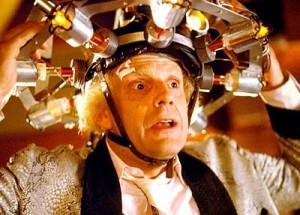A new paper published by Amar Sarkar, Ann Dowker, and Roi Cohen Kadosh has shown that identical transcranial direct current stimulation (tDCS) exerts opposite behavioural and physiological effects depending on individual trait levels. Recent studies have suggested that non-invasive brain stimulation can accelerate skill acquisition in complex tasks and may provide an alternative or addition to other training methods. However, the Sarker study suggests that zapping your brain might make you better at maths tests – or worse. It depends how anxious you are about taking the test in the first place. See here for the Sarker paper and here for a recent commentary in the New Scientist about a new meta-analysis which has struggled to find out what actual physiological effect tDCS has on the brain.
(Note, this image is Doc Brown from the film Back to the Future, not actual tDCS!)

